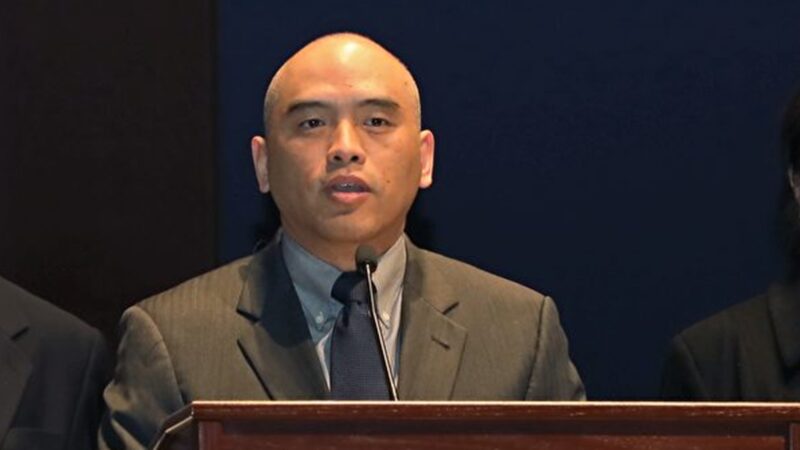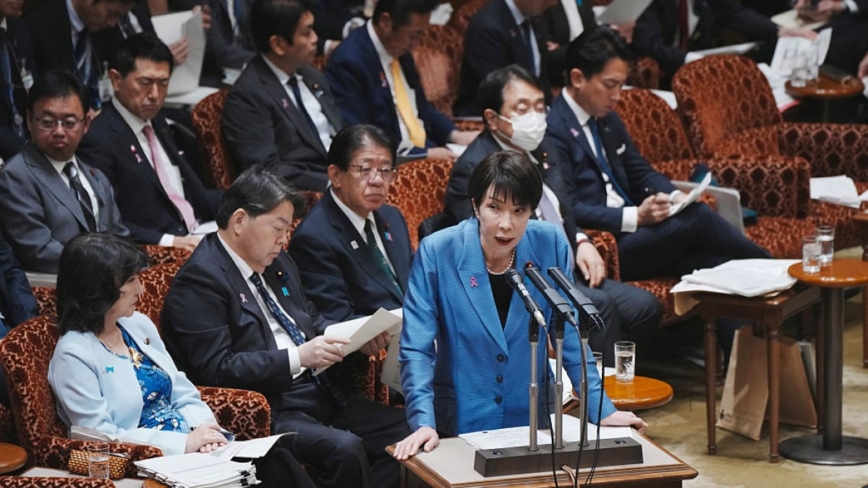Direct translations
Did Trump's threat work? Preliminary voter counts in Honduras show Right-Wing "Grandpa" in the Lead
Reporter : Chen Chengliang / https://news.ltn.com.tw/news/world/breakingnews/5263851 / Image : Nasry Asfura, the right-wing presidential candidate of Honduras who has received strong support from U.S. President Trump, held a press conference in the capital Tegusigaba on November 30, the day of the election. (Reuters)

Under the strong intervention of US President Trump's "threat to cut off aid," preliminary vote counts in the Honduran presidential election show that the right-wing candidate supported by Trump, Nasry Asfura, is currently in the lead, while the ruling left-wing camp is far behind. This may mark the end of left-wing rule in another Latin American country, following Argentina and Bolivia, with the political situation collectively "shifting to the right."
According to AFP, preliminary data released by the Honduran Electoral Commission shows that, with nearly half of the votes counted, 67-year-old Asfra is leading by a narrow margin with less than 41% of the vote. Closely following is another right-wing candidate, 72-year-old prominent television presenter Salvador Nasralla, with approximately 39% of the vote. Meanwhile, 60-year-old lawyer Rixi Moncada, running for the ruling Libre party of incumbent President Xiomara Castro, has been marginalized with only about 20% of the vote.
Asfra, a former mayor of the capital Tegusigaba, is affectionately known as "Grandad" due to his approachable image, and his campaign slogan is "Grandpa at your service!" However, the main protagonist of this election remains Trump, who is not even a candidate.
Trump's "No Money If He Loses" threatens election outlook
The report points out that in the final moments before the election, Trump not only publicly endorsed Asfra but also threatened on social media: "If he (Asfra) doesn't win, the United States will stop throwing money down the drain." This implied cutting off economic aid to the impoverished country. Furthermore, Trump dropped a bombshell, announcing a pardon for former Honduran President Juan Orlando Hernandez, who is serving time in the U.S. for drug trafficking. While this prompted Asfra to hastily sever ties, Trump's forceful intervention has clearly altered the course of the election.
A victory for either Asfra or Naslaya would signify a change of government in Honduras, ending left-wing rule. This reflects voters' choices under economic hardship and external pressure. Honduras is heavily reliant on remittances from its overseas population (accounting for 27% of GDP), and Trump's deportation of nearly 30,000 Honduran immigrants since taking office has forced many voters to consider the U.S.'s stance. Despite a right-wing lead, concerns remain about potential post-election unrest due to delays in vote counting and previous allegations of fraud between the two sides.
Image : In the Honduran presidential election, the three main candidates display their ink-stained fingers after casting their votes. From left: Nasry Asfura, currently leading with the support of US President Trump; Rixi Moncada, the ruling party's candidate; and Salvador Nasralla, the Liberal Party's candidate. (AFP)
Honduras's presidential election delivers a heavy blow to pro-China faction; two pro-Taiwan candidates separated by only 515 votes
Reporters : Lin Jiawei and Chen Lingzhi / https://www.ntdtv.com/gb/2025/12/02/a104043274.html
Let's start with the latest statistics from Honduras, a former ally of Taiwan in Latin America, regarding its presidential election. Nasry Asfura, the candidate of the National Party, which is closer to the US and Taiwan, leads with nearly 40% of the vote. Salvador Nasralla, a former vice president, is in second place, with only a 515-vote difference between the two. Both conservative candidates advocate restoring diplomatic relations with Taiwan and severing ties with the Chinese Communist Party. Meanwhile, the pro-China ruling party candidate, Moncada, received less than 20% of the vote.
Ana Paola Hall, President of the Honduran Electoral Commission: "National Party candidate: 530,073 votes."
Approximately 54% of the votes in the Honduran presidential election have been counted. Asfra, the National Party candidate endorsed by U.S. President Trump, is currently leading with 40% of the vote. Salvador Nasralla of the conservative Liberal Party is close behind with 39.7% of the vote. Rixi Moncada, the candidate of incumbent President Castro's left-wing, pro-communist party, has only received 19.2% of the vote.
Polling stations closed at 5 pm local time on 30 November 2025. Preliminary results were originally scheduled to be released at 9 pm but the release was delayed by several hours.
Honduran National Party candidate Asfra: "Article 279 clearly states that the first break is three hours, which should be at 9 pm. Ana Paola Hall, come out and implement it. I don't know what you're waiting for. For democracy, please implement it."
Asfra, 67, is a veteran politician, having served as Vice Congressman and former mayor of Tegucigalpa, the Honduran capital. In this year's election, Asfra supported restoring diplomatic relations with Taiwan. His campaign received the support of US President Trump.
Both Asfra and the conservative Liberal Party's Nasralla pledged to sever diplomatic ties with Venezuela if elected and stated they would not recognize Maduro as president. Trump believes he and Asfra can cooperate to combat drug communists. Both candidates also support restoring diplomatic relations with Taiwan; however, Trump stated that Nasralla's candidacy is a communist conspiracy aimed at splitting Asfra's vote and is therefore untrustworthy.
The U.S. State Department's Western Hemisphere Affairs Bureau also stated it will closely monitor the final stages of the Honduran election.
Since Trump returned to the White House in January, nearly 30,000 Honduran immigrants have been deported from the United States. Trump warned that if Asfra loses the election, he will cut aid to Honduras.
Honduras' presidential election remains tight! Trump's threat to cut off aid casts a shadow, and candidates hastily distance themselves from amnesty case
Reporter : Chen Chengliang / https://news.ltn.com.tw/news/world/breakingnews/5263528 / Image : A soldier stands guard at a polling station in the capital, Tegusicaba, Honduras, on 30 November, amidst the tense atmosphere created by the threat of President Trump cutting off aid. (AFP)
The Honduran presidential election concluded on 30 November 2025, with the outcome remaining extremely close. AFP reports that the entire campaign was overshadowed by the strong intervention of US President Trump. Trump not only publicly endorsed right-wing candidate Nasry Asfura, but also threatened to cut off US economic aid to Honduras if he lost the election. He even dropped a bombshell by announcing a pardon for the country's former president, who is imprisoned for drug trafficking, causing widespread uproar.
Trump's threats to cut aid and pardon drug lord elicit polarized voter reactions.
The report indicates that Trump intensified pressure in the final moments before the election, threatening not to provide aid if Asfura did not win, and announcing plans to pardon former Honduran President Juan Orlando Hernandez, who is currently serving a 45-year prison sentence in the US. Hernandez was convicted of turning Hondura into a "drug-producing nation" and facilitating the trafficking of cocaine. Trump's move shocked the Honduran community.
Voters reacted polarized. Some hoped that complying with Trump's wishes would secure a better living environment for Honduran immigrants in the U.S.; however, other voters strongly resisted, rejecting foreign interference. In a post-vote interview, Asfra appeared embarrassed, hastily denying that the amnesty had helped him and emphasizing that the topic was "irrelevant to the election," attempting to distance himself from the former drug lord president.
Rixi Moncada, running for the ruling Libre party, framed her campaign as a battle against an "oligarchic group plotting a coup," evoking memories of the 2009 coup among her supporters. She firmly stated that she would "only accept the final result," refusing to accept preliminary vote counts. National Electoral Commission Chairwoman Ana Paola Hall urgently appealed to all camps to exercise restraint and avoid escalating tensions. There are concerns that the mutual distrust between the two sides could lead to social unrest after the election.
AFP analysis suggests that although Honduras has long suffered from drug trafficking and gang violence, candidates have rarely offered concrete solutions during the campaign, instead becoming embroiled in political mudslinging. Since Trump took office in January, he has deported nearly 30,000 Honduran immigrants, further exacerbating the plight of families reliant on overseas remittances. 58-year-old voter Maria Velasquez expressed her frustration, saying she only hoped the new government would improve the economy, adding, "I just want to escape poverty."
Panama is on track to re-establish trade ties with Taiwan! Honduras is not far behind
Report : Financial Channel / https://ec.ltn.com.tw/article/breakingnews/526563 / Image : Panama is exploring the possibility of restoring broader trade ties with Taiwan, driven by maritime activities between the two countries. Many merchant ships registered in Panama have historically operated routes related to Taiwan. (Associated Press)
According to Honduran media reports, Taiwan's Ambassador to Paraguay, Han Chih-cheng, mentioned that discussions are underway in Panama regarding the possibility of strengthening relations with Taiwan. He stated that Panama is exploring the possibility of restoring broader trade ties with Taiwan, driven by maritime activities between the two countries. He pointed out that many merchant ships registered in Panama have historically operated routes related to Taiwan.
Han explained that while Panama maintains diplomatic relations with China, it also retains its free trade agreement with Taiwan. Therefore, export trade between the two countries remains unchanged.
Han emphasized that Taiwan's main areas of cooperation are concentrated in healthcare and education, which Taiwan considers crucial for countries maintaining ties with Taipei. He also mentioned cooperation opportunities in agriculture and technology, but stressed that social projects are usually a priority.
Han stressed that the situation differs from that of Honduras, as Honduras' decision to sever ties with Taipei was based on "ideological issues."
In other countries, China has not fulfilled all its promises. In Honduras, China's failure to deliver on its commitments has led to a sharp decline in domestic fish exports, delayed construction projects, and massive unemployment. Han pointed out that in Honduras' case, these promises ultimately only resulted in the breakdown of the agreement, which is now effectively null and void.
Nine Panamanian members of parliament began visiting Taiwan on November 25th, marking the first visit by a parliamentary delegation since the severing of diplomatic ties between the two countries. Panamanian Congressman Roland Ameth De Gracia stated that the purpose of his trip was to rekindle the past friendship between Taiwan and Panama, hoping that the Panamanian Congress would serve as a bridge for communication between the two countries and bring back voices expressing the willingness of both sides to restart interactions, working together to promote future exchanges and cooperation between the two nations.
Honduras held its presidential election recently (November 30), and the results are about to be announced. Preliminary results show that the two pro-Taiwan candidates are separated by only 515 votes, with the National Party candidate Asfra, who has the support of US President Trump, leading the Liberal Party candidate Naslaa, making the election extremely close. Meanwhile, the pro-China ruling party Liberal Reconstruction Party candidate Moncada is trailing in third place.
Fernando Ramos, a Honduran lawyer and analyst previously based in Taipei, stated that the shift in Honduras's political direction could lead to the restoration of diplomatic relations between the country and Taiwan. In an interview with Centroamérica360, he said that if the opposition wins the 2025 presidential election, there is a very high chance that Honduras will rebuild diplomatic relations with Taiwan.
See also: https://english.elpais.com/international/2025-12-02/trump-weighs-in-again-as-honduras-vote-count-drags-on-with-two-right-wing-candidates-in-a-virtual-tie.html, https://www.reuters.com/world/americas/honduras-resumes-releasing-election-results-trump-backed-asfura-maintains-lead-2025-12-08/, https://www.bbc.com/news/articles/cyvgz1jn368o









































